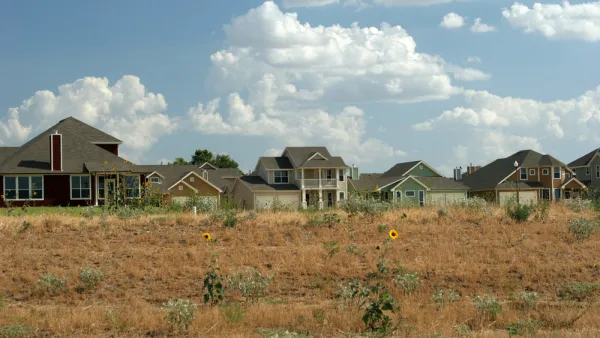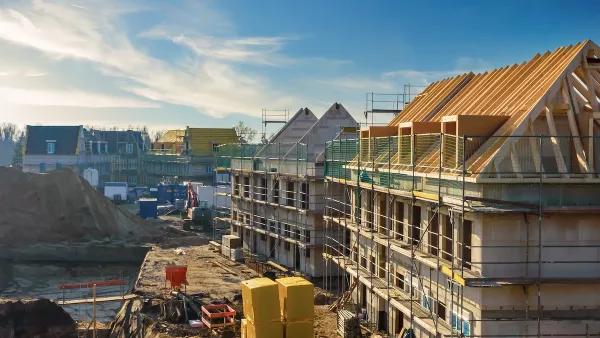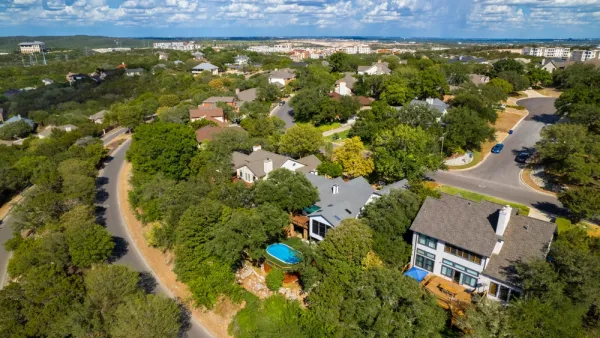Thanks to Planetizen, I found “Opportunity Urbanism,” a report that posits Houston as “an emerging paradigm for the 21st century.” (There's a related op-ed here.) The report, regrettably, is a manifesto as empty as the title -- which Kotkin clearly hopes will become a catchphrase. So why is it important?
Thanks to Planetizen, I found "Opportunity Urbanism," a report that posits Houston as "an emerging paradigm for the 21st century." (There's a related op-ed here.) The report, regrettably, is a manifesto as empty as the title -- which Kotkin clearly hopes will become a catchphrase. So why is it important?
Not even Joel Kotkin, the report's author, thinks Houston is pretty. His project caught my eye, though, because there's too little understanding about how it and similar rapidly expanding cities -- Phoenix, Atlanta, Charlotte, and so on -- balance growth, wealth creation and economic mobility. After all, they're growing while remaining broadly affordable.
As Kotkin points out, the east- and west-coast metros that have prospered on high-tech, finance, and the creative economy have become dauntingly expensive places to live, driving out their entrepreneurial talent, their middle class, and often trapping their poor in dead-end jobs, crammed into dim apartments illegally carved out of ranch-house basements. By contrast, the large, fast-growing metros, with new starter homes "from the low $160s!!!" as the billboards shout, seem to have found a kind of sweet spot. At least that's the thesis of Kotkin's report.
He and his consultants assemble a rosy picture of growth and economic mobility out of broad national statistics from "selected cities." Such a numbers-driven approach, without some context on the ground (it's hard to tell if Kotkin even visited Houston) tells us little about what is unique about the city nor what it shares with similar high-growth metros.
The biggest problem is that he argues that income growth taken alone is a measure of economic equality. (You don't know what the base is.) In cities Kotkin doesn't examine, like Jacksonville or El Paso, you can get a great deal of growth with little economic mobility.
He talks about the low burdens to business growth, the resistance to taxes, and the excessive regulation that makes the wealthier coastal metros less competitive. But these are very timeworn arguments and there are plenty of places that provide these conditions yet fail to grow.
Even in Phoenix and Atlanta (where Kotkins numbers generally look better than Houston's) do the statistics obscure a mobility slowed by a dysfunctional educational system? Endless commutes where car costs eat up wages? A stultifying lack of amenities? Zero home appreciation? These are questions I wish Kotkin's work had answered.
And it's undercut by the aspirations these places have for themselves. They know they can't live on a back-office and call-center economy forever. Each is looking for the magic bullet in high-tech, or bio-tech, or whatever the economic-development gimmick du jour is.
And yet . I admire the ethos of openness and possibility that is palpable in these places. It has indeed vanished from self-satisfied, museumized New England. In too many cities, whiny activism regards anything new as a threat to property values.
The better question to ask is: Can peoples' desire to live in places of predictable stability and amenity be reconciled with an entrepreneurial, adaptable economy that spreads its benefits widely? I think the answer is yes, but we've got to look deeper – at all the "economies" that drive mobility and wealth diffusion.

National Parks Layoffs Will Cause Communities to Lose Billions
Thousands of essential park workers were laid off this week, just before the busy spring break season.

Retro-silient?: America’s First “Eco-burb,” The Woodlands Turns 50
A master-planned community north of Houston offers lessons on green infrastructure and resilient design, but falls short of its founder’s lofty affordability and walkability goals.

Delivering for America Plan Will Downgrade Mail Service in at Least 49.5 Percent of Zip Codes
Republican and Democrat lawmakers criticize the plan for its disproportionate negative impact on rural communities.

Test News Post 1
This is a summary

Test News Headline 46
Test for the image on the front page.

Balancing Bombs and Butterflies: How the National Guard Protects a Rare Species
The National Guard at Fort Indiantown Gap uses GIS technology and land management strategies to balance military training with conservation efforts, ensuring the survival of the rare eastern regal fritillary butterfly.
Urban Design for Planners 1: Software Tools
This six-course series explores essential urban design concepts using open source software and equips planners with the tools they need to participate fully in the urban design process.
Planning for Universal Design
Learn the tools for implementing Universal Design in planning regulations.
EMC Planning Group, Inc.
Planetizen
Planetizen
Mpact (formerly Rail~Volution)
Great Falls Development Authority, Inc.
HUDs Office of Policy Development and Research
NYU Wagner Graduate School of Public Service






























